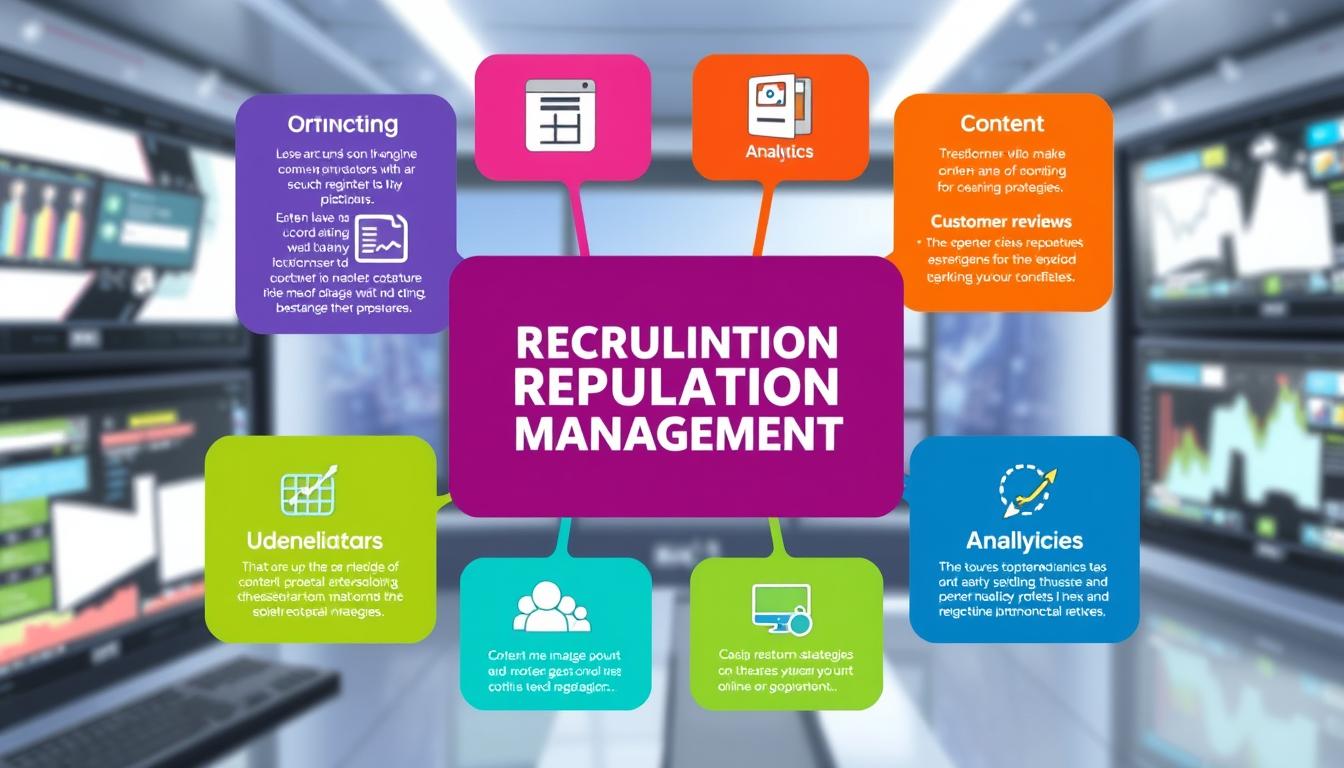Keeping your online reputation in check is key. A single bad comment can hurt your image and success. Online Reputation Management (ORM) helps you watch, shape, and boost your online image. It’s vital as social media, review sites, and more shape how people see you.
Knowing the different ORM strategies is crucial for a good online image. From being proactive to handling crises, ORM has many ways to tackle reputation issues. Whether you run a business, work as a pro, or are just someone online, learning ORM can greatly improve your online standing and success.
Get your questions about ORM answered in a free consultation. Request now >>>
Key Takeaways
- Online reputation includes customer reviews, social media, and search results.
- Customer reviews greatly affect how people see and buy from you.
- Being active on social media helps build loyalty and shows your brand’s personality.
- Good search results boost your credibility and visibility. Effective SEO lets you control your online content.
- Good ORM means being proactive, creating smart content, and managing crises to keep a positive online image.
Introduction to Online Reputation Management (ORM)
Keeping a good online image is key for everyone. Online Reputation Management (ORM) helps manage how people see you or your business online. With social media and online reviews, one bad comment can hurt your reputation a lot.
Definition and Importance of ORM
ORM uses various strategies to make sure your online image is good. The role of ORM is huge. A study found that 58% of adults in the US think a company’s reputation is very important when buying something. Another study showed that 33% see it as somewhat important.
Keeping a good online image is vital for trust and attracting customers. It also affects hiring, as nearly 70% of job seekers would turn down a job offer from a company with a bad reputation. On the other hand, a bad reputation can cause big financial and image problems, with 90% of people avoiding businesses with bad reputations.
Knowing how to use ORM strategies well is crucial for success in the digital world.

SEO-Based Online Reputation Management
In today’s digital world, SEO is key for managing your online image. By optimizing your web pages and content, you can shape your online reputation. This way, positive info about you or your business shows up first in search results.
Step-by-Step Plan for SEO-Based ORM
To create a solid SEO-based ORM plan, follow these steps:
- Search for your name, business, or key terms on big search engines. Look for any negative results that might hurt your reputation.
- Make high-quality, informative content that uses the same keywords as the negative results. This helps push them down in search rankings.
- Get backlinks to your positive content from trusted and relevant sites. This boosts its visibility and search rankings.
By taking these steps, you can use SEO to manage and improve your online image.
Identifying Negative Search Results and Creating High-Quality Content
The first step is to research your online presence. Look for any negative search results that might harm your reputation. This could include bad news articles, critical reviews, or negative social media posts.
After finding these issues, start making high-quality, SEO-optimized content. This content should be informative, engaging, and aim to outrank the negative info in search results.
Get your questions about Reputation Management answered in a free consultation. Request now >>>
Building Backlinks for Reputation
Creating quality content is just part of the job. Building a strong backlink profile is also crucial. Reach out to industry influencers, relevant sites, and trusted sources for high-quality backlinks. These backlinks show search engines your positive content is credible and important.

With a solid SEO-based ORM strategy, you can control your online reputation. Make sure the info people see about you or your business is accurate, positive, and shows your true value.
Content-Based Online Reputation Management
In today’s digital world, your online reputation is crucial. It can make or break your personal brand or business. Content-based online reputation management helps you create, promote, and manage quality content. This approach shapes how people see you online.
Identifying Relevant Keywords for Reputation
First, find the keywords that matter for your reputation. Research what your audience looks for and any negative terms. This helps you make content that answers their questions and addresses their concerns.
Creating High-Quality Content for Reputation
After finding the right keywords, create content that shows your expertise and values. Use formats like blog posts, videos, and infographics. Make sure your content is informative, well-researched, and fits your brand’s style.
Promoting Content for Reputation
Creating great content is just the start. You need to share it with your audience. Use social media, email, influencer partnerships, and ads to get your content seen. This makes your reputation stronger and encourages more interaction with your audience.
Thought Leadership and User-Generated Content for Reputation
Also, focus on thought leadership and user-generated content. Being seen as an expert builds trust. Using content from others shows you value their opinions. This strengthens your reputation.
With a solid content-based online reputation management plan, you can control your digital image. You can tackle negative views and build a strong, positive reputation. This supports your personal or business goals.

Social Media Online Reputation Management
Social media is a big part of our lives today. It changes how we connect and manage our reputations. Managing your online reputation on social media is key to a positive image.
Managing your social media reputation means watching, talking, and answering your audience. A good strategy helps you handle bad feedback and show your good side. It also helps you build strong relationships with your followers.
Studies show that 51% of people remember brands that reply on social media. Also, 76% read online reviews when looking for local businesses. And 46% trust online reviews as much as friends’ or family’s advice.
To manage your social media reputation well, focus on these strategies:
- Watch your brand mentions and talk to your audience on platforms like Facebook, Instagram, Twitter, LinkedIn, and more.
- Quickly respond to all feedback, showing you care about your customers.
- Use content from your followers to show your brand’s good side and gain trust.
- Work with influencers or experts to make your brand more credible and reach more people.
- Share valuable, high-quality content that your audience will like.
Using these strategies can help you manage your online image. It builds stronger connections with your audience and makes your brand a trusted leader.
| Social Media Platform | Monthly Active Users (billions) |
|---|---|
| 3.049 | |
| 2.4 | |
| 1.0 | |
| YouTube | 2.70 |
| TikTok | 1.7 |
In today’s world, your social media image is crucial. By actively managing your online presence, you can boost your brand’s trustworthiness. This puts you ahead in your field.

“Responding to customers on social media makes brands the most memorable.” – 51% of Consumers
Review Management for Positive Online Reputation
In today’s digital world, reviews are key to your online image. A bad review can scare off customers, while a good one can draw them in. It’s vital to manage reviews well to keep a good online image and gain trust.
Get your questions about ORM answered in a free consultation. Request now >>>
Identifying Relevant Review Websites and Monitoring Negative Reviews
First, find the right review sites for your field. Sites like Google Reviews, Yelp, and TripAdvisor are good places to start. Keep an eye on these sites for bad reviews and fix them fast. A quick, kind response can turn a critic into a fan.
Encouraging Positive Reviews and Building Social Proof
Get happy customers to write good reviews. You can offer deals or special perks to encourage them. By managing your reviews well, you can show off your strengths and attract more customers.
| Review Platform | Percentage of Consumers Checking Reviews |
|---|---|
| Google Reviews | 63% |
| Yelp | 45% |
| TripAdvisor | 30% |
| 23% |
Managing your online reviews can really help your business. Studies show that companies that manage their online image well can see a 25% sales boost. Also, 89% of young adults and 76% of all people trust online reviews as much as personal recommendations.
“Negative reviews can be turned into positive ones by responding to them promptly and professionally.” – Industry Expert
In short, managing reviews is key to a good online image. By watching for bad reviews and encouraging good ones, you can build trust and attract more people to your business.

Public Relations (PR) for Online Reputation Management
Effective online reputation management needs a solid PR strategy. PR is key in building and keeping a good reputation online. It helps you control your digital story and protect your brand from crises.
Creating a PR Strategy for Reputation
First, create a detailed PR strategy. This means finding the right media, making engaging stories, and connecting with journalists and influencers. By sharing positive news and ideas, you can get good media coverage and boost your online image.
Crisis Communication Planning for Reputation Management
Even with careful planning, crises can still happen. It’s vital to have a crisis plan ready. This plan should show how to respond quickly and well to bad news, keeping your messages clear and caring.
By using smart PR and crisis planning, you can manage your public relations for online reputation management. This builds a strong, positive online presence that people trust and believe in.
“One negative article in an online search could result in a 22% loss in business.” – ReviewTrackers
types of online reputation management
Online Reputation Management (ORM) is about keeping a good image online. It uses many strategies to make sure what people see about you is positive. Let’s look at the different ways to manage your online reputation:
SEO-Based Reputation Management
This method makes your website better for search engines. It helps push down bad stuff and shows off the good. This way, more people see the positive side of you or your business.
Content-Based Reputation Management
Creating interesting content helps a lot. It can be on blogs, social media, or guest posts. This way, you show you’re knowledgeable and have a good online image.
Social Media Reputation Management
Being active on social media is key. Answering comments and working with influencers can really help your image.
Review Management
It’s important to watch what people say about you online. Sites like Google and Yelp are big. You should always be ready to respond to reviews.
Public Relations (PR)-Based Reputation Management
Good PR can make a big difference. It’s about getting positive news and handling tough times well. This helps build a strong online image.
Personal Reputation Management
Everyone can manage their online image. It’s about keeping your social media in check and dealing with any bad stuff that shows up.
Corporate Reputation Management Solutions
Businesses have tools to help with their online image. These include tracking mentions, managing crises, and handling reviews. It’s all about staying on top of your online presence.
By using a mix of these strategies, you can keep a good image online. This helps your brand and can lead to success in the long run.
| Type of ORM | Key Focus | Example Strategies |
|---|---|---|
| SEO-Based | Improving search engine rankings | Content optimization, backlink building |
| Content-Based | Establishing thought leadership | Blogging, guest posting, social media content |
| Social Media | Managing social media presence | Engaging with followers, influencer partnerships |
| Review Management | Monitoring and addressing reviews | Responding to customer reviews, building social proof |
| PR-Based | Building positive media coverage | Media relations, crisis communication planning |
| Personal | Managing individual online presence | Reputation monitoring, social media management |
| Corporate | Comprehensive business-level ORM | Brand monitoring, online review management |
Using a mix of these types of online reputation management helps keep a good image online. It boosts your brand and leads to success.
“Reputation is the cornerstone of success in the digital age. A strong online presence can make or break a business or individual’s future.”
Personal Online Reputation Management Strategies
In today’s digital world, your online reputation is key to success. About 95% of people search online to learn about individuals or businesses. What they find can shape their opinions and choices. So, managing your online reputation is vital for a good public image.
Creating a strong online presence is a top strategy. Use social media platforms like LinkedIn for a professional profile. Share relevant content and updates to show your expertise and build trust.
- Keep your social media profiles updated with quality content to highlight your skills and achievements.
- Join online discussions and forums to show you’re a leader in your field.
- Ask happy clients or colleagues to leave positive reviews on your social media or professional profiles.
Managing your online reviews is also crucial. Watch sites like Yelp, Google, or Glassdoor for feedback. Respond quickly to any negative comments in a professional way. This can lessen the harm of bad reviews and show your dedication to service.
“Negative search results can have a damaging effect on personal or professional reputation. Individuals with negative information on the first page of Google search results are perceived to have a bad reputation.”
Lastly, think about working with a personal reputation management company. They can help you create and follow a plan to keep your online image positive. They use tools like content creation, SEO, and social media management to shape your online story.
By using these strategies, you can manage your online presence. This boosts your professional credibility and sets you up for success in your personal and professional life.
Corporate Online Reputation Management Solutions
In today’s digital world, keeping a good online image is key for businesses to succeed. Companies use online reputation management (ORM) services to watch and manage what people say about them online. These services use different strategies to check, build, protect, and fix a company’s online image.
Proactive Corporate Reputation Management Tactics
Proactive reputation management means being ahead of the game to keep a good online image. Key steps include:
- Creating a strong online presence through SEO and content
- Getting and managing positive customer reviews
- Using social media to talk to customers and share brand messages
- Always watching the company’s online image to spot and fix problems
Reactive Corporate Reputation Management Tactics
Reactive reputation management is about fixing and lessening the impact of bad feedback or crises. Tactics include:
- Quickly answering and solving negative online reviews or comments
- Using crisis communication to handle and lessen the damage of bad events
- Working with influencers, experts, and media to spread good brand messages
- Always watching the company’s online image and quickly fixing any issues
By using both proactive and reactive steps, businesses can manage their corporate online reputation management well. This builds trust, credibility, and a strong brand image online.
| Proactive Corporate Reputation Management | Reactive Corporate Reputation Management |
|---|---|
|
|
Effective corporate online reputation management is vital for businesses to gain trust, credibility, and a strong brand image online. By using both proactive and reactive steps, companies can keep a good online image. This helps drive business growth and success.
Brand Mention Monitoring for Reputation Management
In today’s digital world, your brand’s reputation is shaped by online conversations. This includes blog posts, social media, industry forums, and customer reviews. Keeping an eye on these mentions is key to managing your online reputation.
By checking what people say about your brand, you learn a lot. You find out what customers like and dislike. You also see what’s good about your brand. This helps you fix problems and use the good stuff in your marketing.
A good brand mention monitoring plan means you never miss a mention. This way, you can quickly respond to any issues. It helps keep your reputation strong.
- Online reputation monitoring is more than just Yelp and G2. It includes news, forums, social media, YouTube, and more.
- Brands should watch platforms where they’re not active. This catches honest talks that could affect their image.
- Watch for branded searches, product terms, industry words, competitor mentions, and other related keywords.
- By tracking conversations over time, you can see trends and how people feel about your brand.
- Special tools are needed to keep up with all these digital talks across different places.
Good brand mention monitoring helps your business a lot. It boosts your brand’s image, improves customer ties, and gives you a leg up on the competition. It also helps prevent crises and keeps your team informed. By managing your online image, you can fix problems fast and show your brand’s best side to your audience.
Reputation Attack Monitoring and Response Strategies
In today’s digital world, businesses and individuals face threats like negative news or social media backlash. It’s key to watch for these threats with reputation attack monitoring. This way, you can spot and tackle threats early on. It helps you stay one step ahead and use effective reputation attack response strategies.
Having a crisis communication plan is vital. It tells you how to handle a crisis, reduce damage, and get your reputation back. Quick and professional responses can change a bad situation into a good one. It shows you care about your customers and stakeholders.
Online reputation crisis management needs a detailed plan. This might include fixing bad reviews, fighting false claims, and sharing good news. Being proactive and having a solid strategy helps protect your online image. This ensures success in the digital world.
| Reputation Attack Monitoring Strategies | Reputation Attack Response Strategies |
|---|---|
|
|
By watching your online reputation closely and having a strong plan, you can handle attacks well. Stay alert, act fast, and be open in your communication. This way, you can turn a crisis into a chance to grow your online image and trustworthiness.
Influencer Reputation Management Techniques
In today’s digital world, your online reputation is key to success. One effective way to boost your reputation is through influencer reputation management. By using the trust of industry influencers, you can spread your positive message and reach your audience better.
To use influencer reputation management well, first find the right influencers. Look for those who share your brand’s values and have followers in your market. Work with them to create top-notch content that shows your expertise and fits your brand’s story.
- Use the influencer’s platforms to reach more people and grow your brand’s awareness.
- Ask the influencer to share positive feedback from their followers to improve your online image.
- Keep an eye on how well the influencer works for you and change your plan if needed.
Remember, using influencers for reputation management is an ongoing effort. It’s about building real connections and keeping a good online image over time. By choosing the right influencers, you can navigate the digital world well and build a strong, reliable reputation that helps your business grow.
“Influencer marketing allows brands to embed themselves in organic conversations led by trusted individuals, enhancing brand credibility and authenticity in consumer perceptions.”
As people’s shopping habits change, with 49% of them making choices based on influencer advice, investing in influencer reputation management is smart for any business. By using influencers, you can manage your online image and set your brand up for success in the long run.
Legal Approaches to Online Reputation Management
Protecting your online reputation is key, and sometimes, legal steps are needed. Legal methods for managing online reputation involve working with lawyers. They help find and use legal ways to protect your online presence. This might include sending warning letters, starting lawsuits, or asking for harmful content to be taken down.
It’s important to think carefully and plan well when using legal reputation management strategies. This ensures you follow the law. By taking legal steps early, you can tackle problems like false claims, copyright issues, or harmful online content.
The Importance of Legal Reputation Management
Warren Buffet once said, “It takes 20 years to build a reputation and five minutes to ruin it.” This shows how vital it is to manage your online image well. A good online presence can boost your search rankings, leading to more money and trust.
- Companies often top the first and second pages of search results, showing the power of online reputation.
- Dealing with bad reviews carefully can help improve your online image.
- Bad search results can harm your reputation, but good ones can greatly improve it.
Using legal methods for online reputation management helps protect your online image. It keeps negative info away and keeps your image positive and trustworthy to others.
“It takes 20 years to build a reputation and five minutes to ruin it.” – Warren Buffet
Watching your brand’s online presence closely and handling bad search results quickly is crucial. Online reputation management services help with social media, search results, customer experience, online marketing, and reviews.
Conclusion
Keeping a good online reputation is key today. A bad comment or review can hurt your success. Knowing how to manage your online image is important.
There are many ways to handle your online reputation. You can use SEO, create great content, and be active on social media. Managing reviews and using PR and legal strategies also help.
Having a solid ORM plan builds trust and attracts new chances. Online reviews are very important, with 98% of people reading them sometimes. By using SEO and creating quality content, you can improve your brand’s image.
Managing your online reputation well helps keep customers loyal. It also helps you deal with crises and stand out in a busy market. Being proactive and open about your online reputation opens up new chances and strengthens your relationships with customers.

